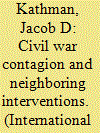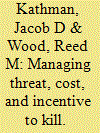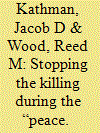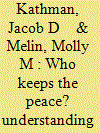|
|
|
Sort Order |
|
|
|
Items / Page
|
|
|
|
|
|
|
| Srl | Item |
| 1 |
ID:
101615


|
|
|
|
|
| Publication |
2010.
|
| Summary/Abstract |
Extant models of civil war intervention have difficulty accounting for the intervention decisions of third-party states that share a border with an ongoing civil war. This is troubling, as contiguous third parties account for a large proportion of interventions. I demonstrate that the tendency of civil wars to spread geographically pose neighbor states with threats to their well-being that are faced by no other type of intervener in the international system. Destruction, regime stability, even state survival are threatened by the prospect of civil war infection. I argue that neighboring third parties are thus motivated to intervene in an attempt to thwart war diffusion across their own borders. Through an analysis of civil war prevalence, I generate a measure of each state's yearly likelihood of being infected by a proximate civil war's hostilities. I then use this measure to explain neighboring interventions in civil wars of the post-WWII period. The results support my theorized expectations.
|
|
|
|
|
|
|
|
|
|
|
|
|
|
|
|
| 2 |
ID:
109931


|
|
|
|
|
| Publication |
2011.
|
| Summary/Abstract |
Third-party states consider the regional destabilization consequences of civil wars when deciding to intervene. However, previous work implicitly assumes that potential interveners base their intervention decisions solely on their links to the civil war country. This approach is unlikely to reflect the regional concerns of interested parties. When a civil war is increasingly likely to infect its surrounding region, potential interveners with strong interests in those states neighboring the conflict will be more likely to intervene to contain the violence. Thus, relationships outside the civil war state-intervener dyad are causally associated with intervention. To test these arguments, the author accounts for the contagious properties of civil wars and the regional interests of third parties, constructing dynamic measures to represent the contagion threat posed to third party regional interests. Analyses of these measures support the argument that third parties are increasingly likely to intervene as the risk of diffusion increasingly threatens their regional interests.
|
|
|
|
|
|
|
|
|
|
|
|
|
|
|
|
| 3 |
ID:
107968


|
|
|
|
|
| Publication |
2011.
|
| Summary/Abstract |
How do third-party interventions affect the severity of mass killings? The authors theorize that episodes of mass killing are the consequence of two factors: (1) the threat perceptions of the perpetrators and (2) the cost of implementing genocidal policies relative to other alternatives. To reduce genocidal hostilities, interveners must address these factors. Doing so requires that interveners alter the genocidaire's expectation of a successful extermination policy, which in turn requires a demonstration of the third party's resolve. This cannot be achieved immediately upon intervention, and, given the perpetrator's strategic response to third-party involvement, the authors expect intervention to increase hostilities in the short term. With time, however, the authors contend that the characteristics of impartial interventions offer the greatest opportunity for reducing the violence in the long term. A statistical analysis of the 1955-2005 period supports the theoretical expectations.
|
|
|
|
|
|
|
|
|
|
|
|
|
|
|
|
| 4 |
ID:
079912


|
|
|
|
|
| Publication |
2007.
|
| Summary/Abstract |
This article investigates the role of direct and reputational information in the onset of interstate war. Scholars have recently identified the importance of separating the phenomenon of conflict from the rare event of war. Building on earlier work concerning the role of reputation and history in the onset of militarized interstate disputes, this article argues that states in crises face competing pressures brought on by their history of interactions with their opponents and their opponents' reputations generated through interactions with other states. While historical conflict reveals private information regarding the credibility of state demands, this history also generates constraints upon the ability of governments to seek peaceful resolutions to the current crisis. An empirical analysis supports the hypothesis that both a direct history of conflict within the dyad and reputational histories for conflict increase the likelihood of war onset. These results hold for a sample including all dyads 1817-2000 and a sample including politically relevant dyads in the same period. The results also suggest that contiguous states are more likely to go to war with each other, as are pairs of major powers, while democracies and pairs of minor powers are less likely to go to war with each other. These results support previous findings on the influence of these factors on the likelihood of war onset
|
|
|
|
|
|
|
|
|
|
|
|
|
|
|
|
| 5 |
ID:
145101


|
|
|
|
|
| Summary/Abstract |
Recent research has investigated the relative effectiveness of peacekeeping in stabilizing postconflict states, preventing the return to armed hostilities between belligerents, and reducing civilian abuse during civil conflict. This research has shed light on important theoretical and policy-relevant issues. However, scholars have largely neglected to evaluate the role of peacekeeping in protecting civilians during the notoriously unstable postconflict period. Even after active conflict has ended, the factions often persist in abusing civilians to reinforce conflict gains, shape the postconflict environment, exact revenge for wartime grievances, or spoil peace processes. This analysis investigates the effectiveness of peacekeeping missions in protecting civilians during the post-conflict “peace.” Using newly collected data on the number and type of United Nations peacekeeping personnel commitments along with civilian victimization data for all African conflicts between 1992 and 2010, we find that greater numbers of peacekeeping troops reduce anticivilian violence. By contrast, larger deployments of UN observers are positively correlated with violence.
|
|
|
|
|
|
|
|
|
|
|
|
|
|
|
|
| 6 |
ID:
153922


|
|
|
|
|
| Summary/Abstract |
Recent research demonstrates that larger and better-equipped United Nations peacekeeping missions more effectively ensure peace and security. This raises an important question: what explains the willingness of member-states to contribute the substantial numbers of troops needed to achieve peacekeeping goals? We argue that narrow member-state security interests offer an important explanation. We find that states embroiled in an ongoing rivalry with another state in the international system contribute more personnel to ongoing missions. Additionally, we find that regimes concerned about coup attempts increase deployments to peacekeeping operations. In a more general sense, this article suggests that the provision of security by peacekeeping operations to their host states is partially dependent upon higher levels of insecurity elsewhere in the international system.
|
|
|
|
|
|
|
|
|
|
|
|
|
|
|
|
|
|
|
|
|